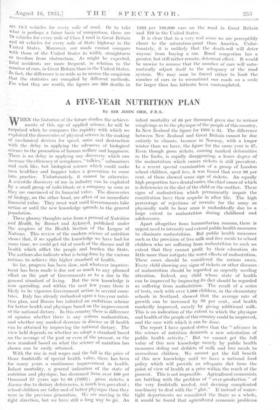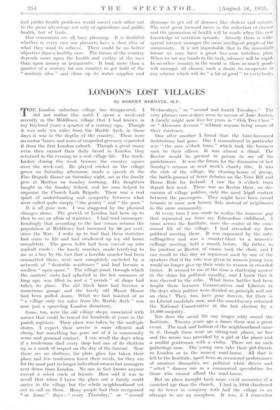A FIVE - YEAR NUTRITION PLAN
By SIR JOHN ORR, F.R.S.
WIIEN,the historian of the future studies the achieve- ments of this age of applied science, he will be surprised when. he -compares the rapidity with which we exploited the discoveries of physical science in the making of mechanical devices for speed, noise and destruction With the . delay in .applying the advances of biological science to the, promotion of human welfare and happiness. There is no delay in applying any discovery which can increase the efficiency of aeroplanes, " talkies," submarines and such like, but biological science which could make inen healthier and happier takes a generation to come n to ,practice. Unfortunately, it cannot be otherwise. A scientific discovery of use in industry can be exploited by a small, group of individuals or a company so soon as they are convinced of its financial value. The discoveries of biology,. on the :other hand, are often of no immediate linancial:.value. They must wait until Governments take action or until the new knowledge spreads to the general population.
These gloomy thoughts arise from a perusal of Nutrition and ifialik, by. Burnet and Aykroyd, published under the auspices of the Health Section of the League of Nat ions. This review Of the modern science of nutrition shows that, if we applied the, knowledge we have had for some time, we could get rid, of much of the disease and ill health which afflict the -people and burden the State. The authors also indicate what is being done by the various nations to achieve this higher standard of health. So far, progress has been Slow, and whatever improve- ment has been made is due not so much to any planned effort on the part of GoVernments as to a rise in the general standard of living. But the new knowledge is now spreading, and within the next few years there is likely to be vigorous Government action in several coun- tries. Italy has already embarked upon a ten-year nutri- tion plan, and Russia has initiated an ambitious scheme for better health and physique based on the improvement of the national dietary. In this country there is difference of opinion whether there is any serious malnutrition, and whether any marked decrease in disease or ill health can be attained by improving the national dietary. The view held depends on whether we adopt a standard based on the average of the Past or even of the present, or the new standard based on what the science of nutrition has phown can be easily attained.
With 'the rise in real Wages and the fall in the price of those foodstuffs of special health value, there has been for many years a continuous improvement in health. Infant mortality, a' general indication of the state of nutrition and physique, has decreased from over 100 per thousand 25 years ago to 68 (1932) ; gross rickets, a disease due to dietary deficiencies, is much leSS. prevalent ; school-children are t alter and of better phYsigne than they were in the 'previous' generation. We are moving in the right direction, but we have still a long way to go. An infant mortality of 68 per thousand gives rise to' serious misgivings as to the physique of the people of this country. In New Zealand the figure for 1932 is 81. The difference between New Zealand and Great Britain cannot be due entirely to climate, because in Norway, with a longer winter than we have, the figure for the same year is 47. Even though gross rickets, causing marked deformities in the limbs, is rapidly disappearing, a lesser degree of the malnutrition which causes rickets is still prevalent: In a recent special examination of a group of London school children, aged five, it was found that over 80 per cent. of them showed some sign of rickets. An equally high proportion have dental caries, the chief cause of which is deficiencies in the diet of the child or the mother. These signs of malnutrition which permanently impair the constitution have their sequelle in after life. The high Percentage of rejections of recruits for the army as physically unfit to bear arms is undoubtedly due to a large extent to malnutrition during childhood and adolescence.
• Apart altogether from humanitarian reasons, there is urgent need to intensify and extend public health measures to eliminate malnutrition. But, public health measures such as the provision of free milk and free meals to school children who are suffering from malnutrition to such an extent that they cannot profit by their education do little more than mitigate the worst effects of malnutrition. These cases should be considered the serious eases, Every child showing any signs of rickets or other diseases of malnutrition should be regarded as urgently needing attention. Indeed, any child whose state of health can be improved by improving its diet should be regarded as suffering from malnutrition. The result of a series of tests, each with over 1,000 children, in the elementary schools in Scotland, showed that the average rate of growth can be increased by 20 per cent., and health markedly improved, merely by giving, additional milk. This is an indication of the extent to which the physique and health of the people of this country could be improved, and the ease with which it can be done.
The report I have quoted states that the " advance in the science of nutrition demands a new orientation of public health activity." But we cannot get the full value of this new knowledge merely by public health measures doling out driblets of milk and free meals to necessitous children. We cannot get the full benefit of this new knowledge until we have a national food policy which will provide an adequate diet from the point of view of health at a price within the reach of the poorest. This is not impossible. Agricultural economists are battling with the problem of " over-production " of the very foodstuffs needed, and devising complicated machinery to deal with the " glut." If instead of water-, tight departments we considered the State as a whole, it would be found that agricultural economic problems and public health problems would cancel each other out to the great advantage not only of agriculture and public health, but of trade.
Our economists are all busy planning. It is doubtful whether in every case our planners have a clear idea of what they want to achieve. There could be no better objective than a healthy race. The future of the country depends more upon the health and virility of the race than upon money or armaments. It took more than a quarter of a century for our country to get hold of the ." sanitary, idea '? and clean up -its. water supplies and drainage to get rid' of diseases like cholera and. enteric. The next great forward move in the reduction of disease and the promotion of health will be made when this new -knowledge of nutrition spreads. Already there is wide- spread interest amongst the more intelligent people of the community. It is not improbable that in the immediate future we may have a great five-year nutrition plan. When we set our hands to the task, advance will be rapid. In no other country in the world is there so much good- will amongst all classes, such a desire to Co-operate in any scheme which will do " a bit of good " to everybody.



































 Previous page
Previous page